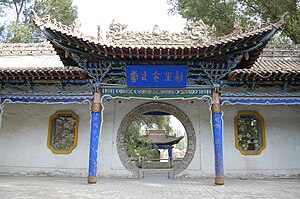Huo Qubing
Huo Qubing , 霍去病, Huò Qùbìng (* in Pingyang; † 117 BC ) was a Chinese military leader.
Life

Huo was born in Pingyang (now Linfen , in Shanxi Province ) as the son of Wei Shaoer . He was a nephew of Empress Wei Zifu and the army leader Wei Qing , under whom he led several campaigns. He became an important military leader, but is said to have poorly fed his soldiers, but they shared in the fame. This ultimately led to some commanders from Wei Qing's army switching to Huo.
In 119 BC BC Huo won a great victory over the Xiongnu , who had not expected that he would cross the Gobi desert . In general, his tactics consisted of quick advances.
Huo died of the plague at the age of 24. His grave in Xingping is made famous by a horse standing over a stone Hun.
His brother Huo Guang later became an important politician.
Legend of the wine spring
Emperor Wudi is said to have thanked him with wine for his victory over the Xiongnu . Huo is said to have poured the wine into a spring in order to let his warriors share in it. The city of Jiuquan ( wine spring ) got its name from this spring, from which wine instead of water gushed from now on . The spring is now a national tourist attraction of the city.
| personal data | |
|---|---|
| SURNAME | Huo, Qubing |
| BRIEF DESCRIPTION | Chinese military leader |
| DATE OF BIRTH | around 140 BC Chr. |
| PLACE OF BIRTH | Pingyang |
| DATE OF DEATH | 117 BC Chr. |

